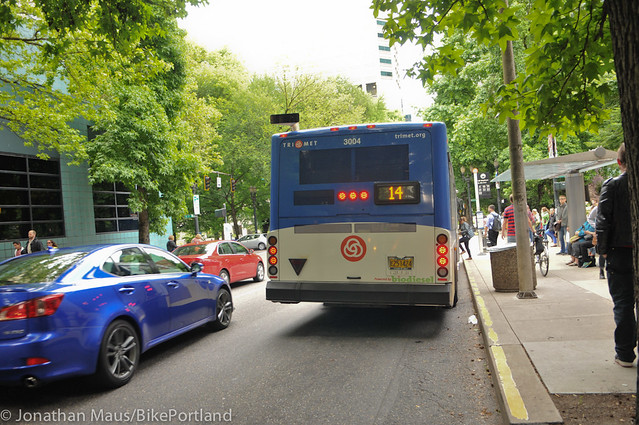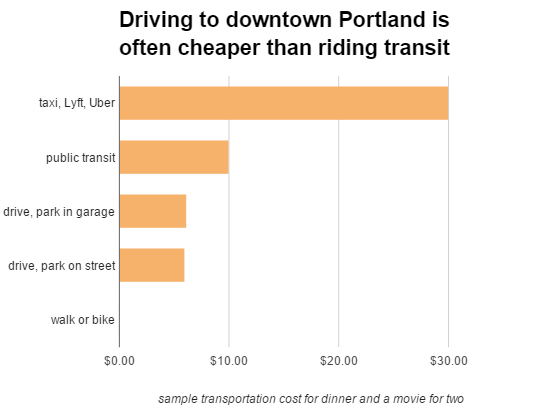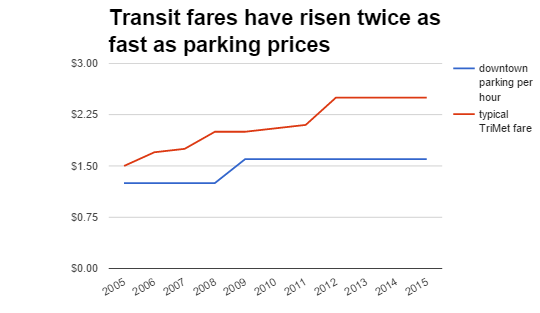
(Photo © J. Maus/BikePortland)
Though lovers of bikes, transit and walking hate to admit it, driving a car is often the most convenient way to get around Portland. Until we start reconfiguring our roads to give more space to bicycling and dedicated transit lines, that will likely remain the case years into the future.
An odd thing about driving is that not only is it usually convenient; it’s also usually pretty cheap.
The question is, why are we also going out of our way to make driving so cheap?
At least, that’s the question asked Sunday by Tony Jordan, a member of the committee that’s currently advising the city on whether it should raise its downtown parking rates from $1.60 to $2 per hour.
When something is more convenient, Jordan points out, we usually have to pay more for it — and we usually agree that this is fair. An odd thing about driving is that not only is it usually convenient; it’s also usually pretty cheap. But an even odder thing, as Jordan explains, is that we’ve made driving both cheap and convenient even though it causes a whole lot of problems.
Here’s how Jordan explains it:
We are doing it wrong.
Global CO2 concentrations are regularly above 400 parts per million. Drought and famine caused by climate change are destabilizing our political environment as well as displacing and killing millions. Driving directly kills more than 30,000 Americans a year (just barely less than firearms). According to MIT, air pollution from driving kills more than 50,000 additional Americans every year.
Financially, the toll of automobile dependency is no less severe. In 2014, federal, state, and local governments spent $165,000,000,000 (165 billion) on roads, with much of that money being spent on construction of new roadways while our existing roads decay.
In the face of these (and many, many other) downsides, we should be using every tool available to discourage unnecessary driving. but we’re not. In fact, not only does the underlying policy of the federal government not discourage driving (even alone), it encourages it. Locally, Portland is trying harder than many cities, but we still maintain a bevy of policies that subsidize and prioritize the most wasteful and dangerous mode of transportation over the rest.
Advertisement
Given that problem, Jordan then imagines a hypothetical trip downtown, maybe a couple going on a date. He looks at the cost of each option.

I’ve added boldface for emphasis:
The Pyramid of Convenience
Being driven in a private-for-hire vehicle from your location to your destination is the most convenient and, likely, pleasant way to travel in the city. As such it’s quite expensive. To take a taxi or a Lyft from inner SE Portland (4 miles out) to downtown will cost upwards of $12 to $15 each way. A two way trip for a dinner and a movie will cost a single traveller $30 in transportation. Additional travelers add to the economy, however, and taking a friend along doesn’t double the charge. Nevertheless, the cost is rather high and reflects the convenience.
The second most convenient (and therefore valuable) mode is driving yourself or being driven with a friend and parking on street near your destination. The same 4 mile round trip will cost roughly $1.16 cents in vehicle wear, gas, etc. Street parking in downtown Portland for a 3 hour stay will range anywhere from $0.00 (after 7PM) to $4.80. Additional passengers add negligible cost. A couple going on a date from 6-9PM will spend ~$5.96 on transportation.
Slightly less convenient is driving yourself and parking in a city operated Smart Park. You may spend a little less time driving around, but you will have to travel farther to your destination. Things get a little interesting here, however, because Smart Park charges 24 hours, with a maximum $5 rate for nights and weekends. The same person or couple mentioned above will pay $5 for a 3 hour trip, regardless of whether it is during meter enforcement. Total cost ~$6.16, twenty cents more than a three hour stay at a parking meter before 7.
Public transportation is next on our list. It has its benefits, no concerns about driving drunk, you can, legally, read or text en route, you don’t have to look for parking. But you need to walk to the transit center or bus stop. You need to allow extra time for catching the line and for possible delays. You have to share space with other people and potentially stand. You will probably have to walk to your destination and all the same things apply to your return trip (assuming TriMet is still operating that late). Bus schedules are rarely aligned with social schedules, so you will likely have to arrive early or arrive late and you may spend some time waiting for a transfer. TriMet fees are charged at all hours of the day. A single person going downtown for a movie and meal will need to buy a day pass for $5. Additional travelers pay full fare, so date night will cost a couple $10 in public transportation fares (and they’ll have to leave for home around midnight).
Person power is, by some measures, the least convenient way to travel. You must contend with the weather and with distracted drivers. Bike parking can be, at times, more frustrating than car parking and rates of theft are higher. A cyclist has no secure location to store bags or coats. Transit time is likely longer. Walking takes even longer and may be impractical for most trips. The cost, however, is (currently) free and you can leave whenever you want and arrive very close to your destination.
Of course there are some costs of biking such as new tubes and tires now and then, and of course there are lots of factors this calculation doesn’t capture such as physical health, the risk of a traffic ticket and so on.
But generally speaking, Jordan is describing the way most Portlanders think about these decisions. And though he doesn’t get into it here, these costs have been shifting. In the last 10 years, central-city transit fares have become a worse and worse deal compared to driving:
Portland says that because it isn’t willing to start knocking its buildings down to build wider roads, the only way to grow is to double its residents’ use of public transit and halve their use of cars.
If that’s the plan, maybe a good place to start would be to make it more expensive to drive than to catch a bus.
(Note: I adjusted two numbers in Jordan’s calculations: according to the latest estimates, each additional mile driven in a small sedan costs about 14.54 cents. He estimated 50 cents, but that includes fixed costs such as insurance, which most Portlanders pay whether or not they chose to drive for a given trip. The gist of his argument is the same; the driving couple saves money either way.)
— Michael Andersen, (503) 333-7824 – michael@bikeportland.org


